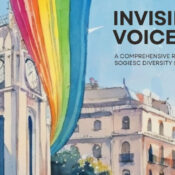
Strengthening Communities, Protecting Lives
Between November 2024 and April 2025; the IPPF Arab World Regional Office (AWRO); in close partnership with SALAMA, IPPF’s Member Association (MA) in Lebanon; spearheaded a critical emergency response to address the urgent needs of LGBTIQ+ individuals and people living with HIV (PLHIV). Implemented by a dedicated local organization; this project became a vital lifeline during one of the most challenging periods Lebanon has faced in recent years.
The war brought widespread destruction and fear; but for LGBTIQ+ individuals and PLHIV; the dangers extended far beyond bombings and displacement. These communities; already marginalized and stigmatized; were met with additional layers of discrimination and rejection. Many were denied access to shelters; refused medical care; and excluded from mainstream humanitarian relief simply because of their sexual orientation, gender identity, or HIV status. The Invisible Voices study exposed harrowing realities; 72% of respondents reported delaying or being denied medical care due to fear of discrimination; 67% were refused shelter; and 81% faced heightened psychological distress due to isolation and stigma.
In this context of compounding vulnerabilities; the intervention led by IPPF AWRO and SALAMA was not just helpful; it was indispensable. It provided essential medical, mental health, and psychosocial support tailored to meet the unique needs of LGBTIQ+ individuals and PLHIV; ensuring that no one was left behind.
Bridging Critical Gaps in Care
Through this partnership; 695 individuals accessed lifesaving services. Medical teams supported 368 people with HIV treatment; hormonal therapy for transgender individuals; and general health consultations. Importantly; 42 PLHIV who were cut off from National AIDS Program clinics received antiretroviral treatments (ART) through alternative distribution models; maintaining their health and safety under extraordinary circumstances.
Mental health was a cornerstone of the response:
- 376 psychological counseling sessions and 53 psychiatric consultations were delivered;
- 21 psychosocial and awareness sessions reached 315 participants; focusing on STI prevention, mental health literacy, and resilience-building.
Capacity Building for Lasting Impact
To enhance sustainability; 22 staff and interns received Mental Health First Aid training; strengthening the local organization’s ability to respond effectively to trauma and crisis. This investment ensures that identity-affirming, trauma-informed care remains available well beyond the immediate emergency.
What Was Missing; A Call to Action
While the intervention achieved its immediate goals; Invisible Voices highlighted significant gaps that must be addressed to safeguard the well-being of LGBTIQ+ communities in future crises:
- Safe Shelters: Over two-thirds of respondents reported fear of rejection or actual denial of shelter; underscoring the urgent need for inclusive, affirming shelter solutions.
- Sustained Mental Health Care: Participants stressed that trauma and anxiety outlast the crisis itself; continued access to mental health services is critical to long-term recovery.
- Structural Change: The study confirmed that exclusion is systemic; humanitarian actors must embed LGBTIQ+ inclusion into all response frameworks; ensuring equal protection and access for all.
As one participant shared; “I was terrified of the bombs, but even more scared that if I sought help, I’d be turned away because of who I am.”
Looking Ahead; Toward a More Inclusive Humanitarian Framework
This initiative; driven by IPPF AWRO’s leadership and SALAMA’s healthcare expertise; demonstrated the profound impact of inclusive humanitarian action. It not only provided lifesaving services; but also highlighted the urgent need to rethink how humanitarian aid is delivered to marginalized communities. Future efforts must prioritize safe shelter; sustained mental health support; and policy reforms that guarantee dignity and protection for all.
The collaboration between IPPF AWRO; SALAMA; and local actors offers a model for inclusive humanitarian response; proving that solidarity and intentional inclusion are essential to building a just and equitable future.


